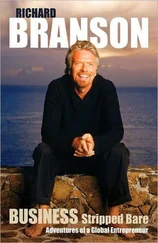Instilling attention to detail throughout your new company will prove especially important when the business begins to gain ground. It always tickles me when a spokesman explains to reporters that a company experiencing delays or other problems is ‘a victim of its own success’ – as though it had undergone something rare and freakish.
The other line that is guaranteed to get my goat is when the excuse for slow service is ‘Sorry but we’re really busy today’. My reaction is always to say, ‘Oh, too bad, but don’t worry, keep this up and it won’t be a problem much longer’.
Finally, when you do start to see success in the form of a stream of new and repeat business, remember to keep a cool head. You’re delivering change, and if you are succeeding, other businesses are very probably getting hurt in the rough and tumble. They will try to shut you down and they will try and emulate what you’re doing. So keep moving and improving: laurels are nice but to rest on them is to risk losing your edge.
Be sportsmanlike, play to win and try to avoid nasty confrontations with your enemies. If you do fall out with a partner, colleague or competitor, let the thing cool off then call them and suggest you get together for dinner. It is likely you have a great deal in common. After all, why did you both get into the business in the first place?
Think again
People tend to think of entrepreneurs as go-it-alone heroes, but this isn’t how it works in real life.
Many live up to their reputation as risk-takers and some remain outsiders, but despite this outlier status, entrepreneurs need support to be successful. In fact, we’re a lot like Formula 1 drivers: the person in the cockpit gets all the glory while fans tend to forget about the pit crews and all the behind-the-scenes effort it takes to keep the engines running and car and driver on the track. The engine that keeps whole national economies on track is driven by entrepreneurs and small business owners. Together they create jobs, fuel growth and, ultimately, transform communities. This means it’s vital that governments, investors and educators find ways to harness this energy source. It also means that encouraging entrepreneurs to start again when a business fails is fundamental to a healthy economy.
For example, an entrepreneur picking himself up after a setback may need a mentor to remind him that this ‘what’s next?’ outlook is everything. My parents taught me from a very young age the importance of maintaining a positive attitude and of taking responsibility for my actions. These are two invaluable building blocks that have shaped my career.
My mother was my first mentor. As a child, I was always impatient to try new challenges whether at home, on the sports field or even at school. When things did not go right (and often they did not!), she would always tell me not to look back in regret, but to move on and try the next thing. I believe this basic attitude is crucial to success in business. Creating a business can be a very tough and lonely experience – many start-ups fail in their early years – but an entrepreneur cannot look at a setback as a bad experience; it’s just part of the learning curve.
To help change the world, we need to nurture young people interested in business to develop this entrepreneurial spirit – not an easy task. Universities and colleges can teach some skills, but I think that most budding entrepreneurs would be better off relying on an informal network of coaches and mentors who have the experience (aka ‘scars’) and expertise needed to coax them forward. I myself rely on an amazing team of advisers, managers and fellow entrepreneurs to help me run the Virgin Group – and, yes, to this day my mother still isn’t shy about expressing her opinion on what I get up to! Creating this kind of mentoring environment was very much what we had in mind when we decided to establish the Branson Centre of Entrepreneurship in Johannesburg and Jamaica. It is not so much a school as an incubator of business talent. It is a place where enthusiastic young people with great ideas can absorb practical business skills while at the same time meeting and learning from successful entrepreneurs from around the world.
The class of 2011 had an emphasis on creating jobs in disadvantaged communities in South Africa and Jamaica, and consisted mostly of entrepreneurs hoping to take their existing businesses to the next level.
One great example of a business nurtured by the South African Centre is Gaming Zone. Based in Soweto, near Johannesburg, and founded by Musa Maphongwane and Amos Mtsolongo, Gaming Zone repurposed shipping containers to create safe and affordable places for its customers – local kids – to play the latest video games. Musa and Amos proudly plan to expand to ‘hundreds of stores’ and also to provide free weekly classes in computer skills that are open to all.
This is a wonderful example of a business that can expand commercially while at the same time making a big impact on the surrounding community – and a perfect example for the new generation of South African entrepreneurs to emulate.
I believe that if we are going to conquer global challenges such as hunger, poverty and climate change, there must be more cooperation, collaboration and shared learning among entrepreneurs. This is why I spend a lot of my time meeting entrepreneurs around the world, looking for great business ideas to foster. This is not just about funding a lot of start-ups; we work hard to help aspiring entrepreneurs to source funding themselves.
In business, there is no substitute for experience. So if you’re an entrepreneur, get on with it. If you’ve achieved success in business, think about giving back to the community by mentoring some promising entrepreneurs. Who knows? They just might be the next Musa and Amos.
A world of opportunities
Given the current state of the world economy, entrepreneurs and business leaders may feel that prospects are gloomy for their start-ups and established companies. With the economies of a number of European countries reeling from the debt crisis, the United States Congress struggling to reach an agreement on raising the government’s debt ceiling and, with the possibility of another global slowdown on the horizon, some executives are making conservative choices in preparation for still more difficult times ahead.
But this is not the time to play it safe: never let mainstream views about markets affect your thinking on new ventures. Uncertain times are often best for setting up new enterprises – talented employees are primed to try new ideas and suppliers are willing to cut prices in order to bring in new clients and extra sales. The secret is to find a product or service that will stand out by improving people’s lives.
A number of people have asked me which industries and sectors entrepreneurs should be looking at in this economic climate. In the past, Virgin has often looked for openings in industries where market leaders were underperforming and not treating their customers properly – as I have pointed out, we have had success in aviation, mobile phone services and financial services. But now we are focusing on the green sector: finding ways to supply renewable energy, produce clean water and figuring out how to conserve both. We believe this area offers the greatest opportunities of our time.
Consider that our society is now facing difficult practical challenges that require innovative, even revolutionary thinking – the staple diet of entrepreneurs. How do we supply enough energy, food and water to meet the demands of our growing global population? How do we lift billions out of poverty without running out of resources? Can we simultaneously restore and protect the natural life-support systems on which we depend?
Читать дальше












